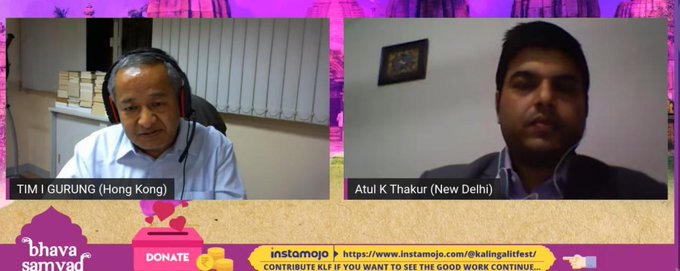Kalinga Literary Festival discusses about glorified history of Gurkhas
New Delhi: In the session with the author Tim I. Gurung on his book ‘Ayo Gorkhali-A History Of Gurkhas’, he expressed that his main reason for writing this book was the glory of Gorkhas serving the army for over 200 years. “I felt it was an obligation on me. Whatever we’ve heard about Gorkhas is mainly about Bravery. It consists about other things. I was inspired to give my part of the story,” said Tim.
Moderator Atul K. Thakur asked, “Nepal has been exercising their choice in the history. Gorkha empire invited British East India Company to set up projects in Nepal. Gurungs are the core members of Gorkhas. Gorkha regiment carries great importance in Indian Army. Gorkha recruitment policies in Nepal army has been changing.”
Tim further told about British invasion. He said, “Nepal didn’t allow Gorkhas to join British army until 1885. British from the very beginning wanted to go to Kathmandu and colonize Nepal. They wanted to recruit youth of Nepal in Army and turn Nepal into Toothless tiger
After WW2, British categorized the people of Gorkhas depending on their ability. Newar, Gurung, Magar and Tamang. Main reason for British to take youth of Nepal in army to weaken Nepal. Gorkhas were very brave and loyal. Many British Diplomats and politicians have already declared that Gorkhas are the reason why Britain has good relation with Nepal. Almost 200,000 people from Nepal went with British army in WW1 and almost 250,000 went in WW2. Gorkhas started Gorkha Justice Campaign in 1990 against British.”
Throwing light on the present era, Tim mentions, “Only grievance which Gorkhas have now is the pension disparity between Gorkha personnel and British personnel. The literacy for new generation is very high now. The readers of the book come from all over the world. This book will also be translated in Nepalese in 2021. Only thing to become in Gurung village is to join the British army.
When I turned 50, I handed over the company to my kids and I turned to writing.The traditional arrangement in army is going to continue.”Both discusses about history of the Gurkha serviceman is one that goes beyond soldiering and bravery—it is in equal measure a story of the resilient human spirit, and of a tiny community that carved for itself a niche in world history.

